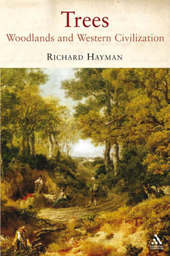
|
Trees: Woodlands and Western Civilization
Paperback / softback
Main Details
| Title |
Trees: Woodlands and Western Civilization
|
| Authors and Contributors |
By (author) Richard Hayman
|
| Physical Properties |
| Format:Paperback / softback | | Pages:336 | | Dimensions(mm): Height 234,Width 156 |
|
| Category/Genre | Historical geography
Trees, wildflowers and plants |
|---|
| ISBN/Barcode |
9781847250513
|
| Classifications | Dewey:304.27 |
|---|
| Audience | |
|---|
| Illustrations |
12
|
|
Publishing Details |
| Publisher |
Bloomsbury Publishing PLC
|
| Imprint |
Hambledon Continuum
|
| Publication Date |
30 June 2007 |
| Publication Country |
United Kingdom
|
Description
Trees are special, being bigger than us both physically and metaphorically. Trees: Woodlands and Western Civilization is an account of our relationship with them. Adam and Eve were expelled from Eden for eating from the Tree of Knowledge and the great tree Yggdrasil was central to Norse mythology. Tacitus, followed by German nationalists and historians of liberty, located freedom in the German forests. Medieval forests were both protected hunting parks and the refuge of Robin Hood. Shakespeare contrasted the simplicity of life in the Forest of Arden with the artificial manners of the court, and indeed poets from Virgil to Hardy have drawn inspiration from trees. While eighteenth-century aristocrats controlled trees in plantations around their houses, Romantics delighted in vast untamed forests, and the American Henry Thoreau withdrew into the woods to reintegrate himself with nature. Throughout history, our views of trees have been affected by the changing use of woodland and the effects of deforestation and urbanisation. How we see trees today will dictate how trees are treated in the future.
Author Biography
Richard Hayman is an archaeologist and architectural historian who writes on the history of the British landscape. His other books include Riddles in Stone: Myths, Archaeology and the Ancient Britons.
Reviews"Richard Hayman's Trees is an entertaining and wise meander through the subject." Reviewed in The London Review of Books, 2007.
|